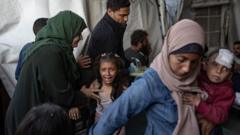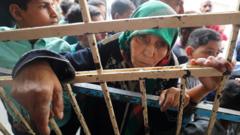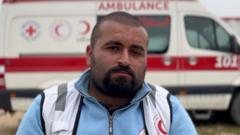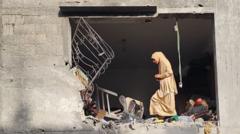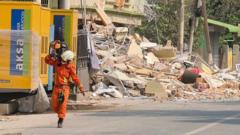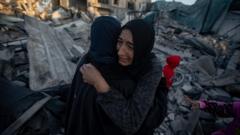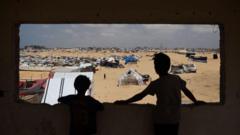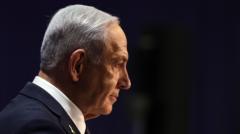The harrowing account of Munther Abed, the sole survivor of an Israeli attack on paramedics in Gaza, raises questions about the military's justification for the strike, as calls for accountability grow louder.
Survivor Testifies to Fatal Israeli Attack on Gaza Paramedics
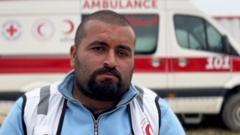
Survivor Testifies to Fatal Israeli Attack on Gaza Paramedics
Munther Abed recounts the tragic event that left 15 emergency workers dead and challenges the Israeli military's narrative.
Paramedic Munther Abed narrowly escaped an Israeli attack on 23 March that claimed the lives of 15 emergency workers by diving into the back of his ambulance. “I’m the only survivor who saw what happened to my colleagues,” Abed stated, sharing images of his fallen fellow paramedics as he described the events leading up to the tragic incident.
The team from the Palestinian Red Crescent was responding to reports of gunfire and injuries in the southern city of Rafah, with all Civil Defence vehicles mobilized by dawn. Abed described how the first vehicles headed out at 04:40, but before long, at approximately 05:00, an Israeli military vehicle opened fire on them, based on claims that the ambulances were advancing suspiciously.
In defense of its actions, the Israeli military asserted that the vehicles moved without coordination and with lights turned off. However, Abed firmly disputes these claims, noting that all lights were operational on their ambulances as per standard procedure.
After the attack, Abed was extracted from the wreckage by Israeli forces, where he reported being subjected to 15 hours of interrogation before being released. The Israel Defense Forces (IDF) have yet to comment on Abed’s allegations.
Israel’s Foreign Minister Gideon Saar defended the military's actions, claiming they targeted identifiable threats, including members of militant groups, but he did not provide evidence linking those killed to any armed factions. Abed rejects the explanation that Hamas may have used ambulances as cover, emphasizing that their sole purpose as medics is to provide humanitarian aid.
In a poignant reminder of the attack’s human toll, paramedics carried their deceased colleagues to their funerals, igniting widespread calls for accountability from grieving families and international observers alike. A week after the attack, the bodies were found buried without proper honor, leading to further outrage over the alleged violation of humanitarian laws.
Sam Rose, acting director of UNRWA's Gaza office, confirmed the deaths of the paramedics and the inhuman conditions of their burial, asserting that a thorough investigation was critical to uncovering the truth. Israel has not yet committed to such an inquiry.
The conflict’s ongoing impact on healthcare workers in Gaza remains deeply concerning, with over 1,060 healthcare professionals reported killed since hostilities escalated. "All ambulance workers, all medics, all humanitarian workers inside Gaza right now feel increasingly insecure, increasingly fragile," said Rose.
As for Abed, he reflects on the deep bond he shared with his colleagues, stating, “They were not just colleagues but friends. I consider them my second family.” He expresses a commitment to share their story and shed light on the alleged crimes perpetrated against his fellow medics, emphasizing the importance of bearing witness to the tragedy.



